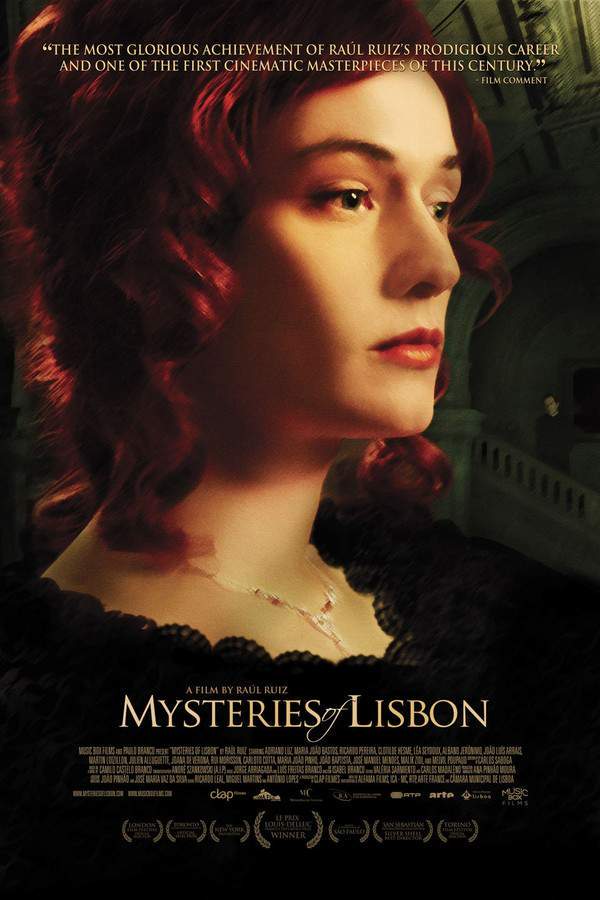
Mysteries of Lisbon 2011
Directed by

Raoul Ruiz
Made by

Music Box Films
Test your knowledge of Mysteries of Lisbon with our quiz!
Mysteries of Lisbon Plot Summary
Read the complete plot summary and ending explained for Mysteries of Lisbon (2011). From turning points to emotional moments, uncover what really happened and why it matters.
As the story unfolds, we meet João Arrais (João Arrais), a young orphan navigating the challenges of life within a Portuguese school under the care of the kind-hearted Father Dinis (Adriano Luz). Set against the backdrop of the Revolução Liberal, João’s innocent nature is brutally challenged as he faces relentless bullying from a classmate who cruelly accuses him of being the child of a criminal. The hardships compound when João falls ill, seemingly marking the climax of his disastrous fate.
In the midst of his suffering, a surprising glimmer of hope appears in the form of a nurturing woman who stays by his bedside with a maternal gaze. Upon his recovery, Father Dinis reveals that this figure is none other than João’s long-lost mother, Countess Ângela de Lima (Maria João Bastos). Imprisoned in her home by her oppressive husband, the Count of Santa Bárbara (Albano Jerónimo), she has led a life steeped in quiet despair. Father Dinis plays a pivotal role in facilitating her escape while her husband fights for his revolutionary beliefs.
As the narrative progresses, we learn that João’s genuine lineage is linked to Pedro da Silva (João Baptista), a young nobleman struggling against poverty and the burdens of status. The situation intensifies when Ângela’s father, the Marquis of Montezelos (Rui Morrison), dismisses da Silva’s marriage proposal and instead opts for the infamous assassin Knife Eater (Ricardo Pereira) to eliminate the financially burdened nobleman. A poignant encounter unfolds as da Silva seeks refuge with Father Dinis, recounting his tale until his untimely demise.
Transforming into a gypsy, Dinis trails Ângela to the countryside, where she gives birth to João. He confronts Knife Eater and secures the assassin’s silence when learning about the plot orchestrated by Ângela’s father to abduct and murder the newborn. Father Dinis, with unwavering resolve, takes on the role of João’s protector while Ângela is forced into marriage with the Count of Santa Bárbara.
In the present, the Count maliciously spreads rumors of Dinis’s presumed affair with Ângela. When Dinis approaches him for a confrontation, he stumbles upon the Count’s dying moments, attended by his devoted maid and lover, Eugénia (Joana de Verona). Dinis also crosses paths with Knife Eater, now known as Alberto de Magalhães, who has returned from Brazil, dripping with wealth accrued through dubious means, and who mockingly taunts the Count’s falsehoods. Following the Count’s death, Ângela chooses to reject her inheritance, opting instead to leave João with Dinis before seeking refuge in a convent.
The narrative deepens as mysteries surrounding Father Dinis’s life begin to unravel, thanks in part to Friar Baltasar da Encarnação’s revelations about his past. Once known as Álvaro de Albuquerque, he had been embroiled in a forbidden romance with the Countess de Vizo, leading them to flee to Italy, where tragedy struck during childbirth. The aftermath of this loss saw Dinis placed in the care of a French nobleman, setting into motion a series of life-altering events.
As Dinis matured, he found himself caught up in Napoleon’s army in Spain under the alias Sebastião de Melo. Meanwhile, Alberto de Magalhães, having reinvented his life, now enjoyed a stable marriage with Eugénia, who once served as the Count’s mistress. However, the past resurfaces in the form of Elisa de Montfort, a vengeful French duchess, determined to settle the score regarding her previous financial entanglements with him.
The intricate connections between characters escalate further when Dinis confides in Elisa regarding her mother’s tragic end. Tensions mount as De Magalhães confronts her, driven by anger, but it is Dinis who intervenes just in time to prevent catastrophe, revealing the depth of animosity lingering between Elisa and De Magalhães.
The evolving tale emphasizes Dinis’s psychological struggles, particularly with his love for Blanche de Montfort, a relationship marred by tragedy caused by her jealous husband, Benoît. Years later, as João grows into a contemplative poet, he encounters Elisa, whose striking resemblance to his mother captivates him. This sparks a love story riddled with vengeance as Elisa persuades him to challenge De Magalhães to a duel. Yet, in a twist, De Magalhães reveals the chilling truths of their shared history and his involvement in the accidental death of Elisa’s twin brother, Arthur.
As João faces his impending fate, he finds peace in dictating his memoirs, haunted by the memories of his mother’s steadfast presence during his childhood ailments. The film reaches its conclusion as João embarks on a journey to a distant colony, irrevocably altered by the harrowing truths unearthed about his family’s complex legacy.
Mysteries of Lisbon Timeline
Follow the complete movie timeline of Mysteries of Lisbon (2011) with every major event in chronological order. Great for understanding complex plots and story progression.
João's Orphaned Life
The story begins with João Arrais, a young orphan navigating the hardships of life at a Portuguese school. Despite the kindness of Father Dinis, João faces relentless bullying from classmates who cruelly accuse him of being the child of a criminal.
João's Illness
As the bullying intensifies, João falls seriously ill, pushing him to the brink of despair. This poignant moment seems to signal the climax of his unfortunate fate and leaves him vulnerable to the challenges surrounding him.
Meeting His Mother
During his convalescence, a nurturing woman appears by his bedside, offering a glimmer of hope amidst his suffering. In a heartfelt revelation, Father Dinis discloses that this woman is João's long-lost mother, Countess Ângela de Lima.
Countess Ângela's Background
Countess Ângela, imprisoned by her oppressive husband, the Count of Santa Bárbara, leads a life laced with quiet despair. The character's depth is revealed as she faces her own struggles while aiming to reunite with João.
The Hidden Young Nobleman
The narrative shifts to Pedro da Silva, a young nobleman battling poverty while aspiring for a future of hope. His attachment to the court is complicated by his aspirations, and the pressures from Ângela's father arise dangerously.
Proposal and Threats
Pedro da Silva's marriage proposal to Ângela is met with rejection from her father, who prefers the infamous assassin known as Knife Eater. To eliminate the nobleman's ambitions, the Marquis of Montezelos plots to eliminate da Silva, escalating the tensions.
Father Dinis's Intervention
In a brave attempt to save João, Father Dinis confronts Knife Eater after tracking down Ângela to the countryside. During this confrontation, Dinis learns of a plot against the newborn, intensifying his protective instincts.
Count of Santa Bárbara's Rumors
In the present, the Count maliciously spreads rumors about Dinis's presumed affair with Ângela. This sets the stage for a confrontation where Dinis encounters the dying Count, revealing complex relationships within the narrative.
Death of the Count
After the Count passes away, Ângela chooses to reject her inheritance, displaying her strength and independence. Her decision to entrust João to Dinis before seeking refuge in a convent speaks volumes about her character.
Father Dinis's Past
As mysteries surrounding Father Dinis unfold, Friar Baltasar reveals Dinis's troubled history as Álvaro de Albuquerque, embroiled in a forbidden romance and subsequent tragedy that shaped his life choices. This backstory adds complexity to Dinis's character.
Dinis in Napoleon's Army
Dinis, now older, finds himself engrossed in Napoleon's army in Spain under an alias. His journey through conflict mirrors the turmoil faced by many characters, binding them through ongoing struggles and trials.
Alberto's New Life
Alberto de Magalhães has reinvented himself, now living a stable life with Eugénia, the former lover of the Count. Yet, shadows of the past linger as Elisa de Montfort reenters the story, driven by vengeance.
Climax of Tension
Tensions culminate when Elisa confronts Alberto over past grievances. Dinis intervenes just in time, highlighting the web of revenge and anger that connects the core characters, showcasing the depth of their shared history.
João's Love Story
As João matures into a thoughtful poet, he encounters Elisa, leading to a love entangled with vengeance over their family lineage. This relationship, charged with tension, prompts him to challenge De Magalhães to a duel.
Final Revelations
In the gripping conclusion, João, faced with his legacy, writes his memoirs. As he comes to terms with his mother’s impact on his life and the dark truths surrounding his family's history, he embarks on a journey that alters his fate forever.
Mysteries of Lisbon Characters
Explore all characters from Mysteries of Lisbon (2011). Get detailed profiles with their roles, arcs, and key relationships explained.
João Arrais
João is a young orphan whose innocence and resilience are tested as he confronts the harsh realities of life in a Portuguese school. His journey encapsulates a struggle against bullying, illness, and the search for familial love. As he matures into a contemplative poet, he grapples with his identity and the weight of his family's troubled past.
Father Dinis
Father Dinis embodies compassion and strength as he protects João, while also wrestling with his own dark past. Once involved in a forbidden romance, his past actions have shaped his character deeply. He serves as a guardian and a mentor figure, navigating the complexities of love, loss, and duty throughout the narrative.
Countess Ângela de Lima
Countess Ângela, João's long-lost mother, embodies a life of quiet despair under her oppressive husband. Her poignant reunification with João serves as a moment of hope amid darkness. She is a symbol of longing for freedom and familial connection, ultimately making sacrifices to ensure her son's safety.
Knife Eater (Alberto de Magalhães)
Initially known as Knife Eater, he represents the darker elements of society, with a past shrouded in crime and revenge. Having reinvented his life, his character is complex, grappling with wealth acquired through dubious means while being haunted by past actions. His encounters with João bring tension and pivotal revelations.
Eugénia
Eugénia plays a significant role in the lives of others, marked by loyalty and a tumultuous past as the former mistress of the Count. Her presence is a reminder of complicated relationships and the echoes of history that shape the present. She forms connections that reveal complexities in the narrative.
Mysteries of Lisbon Settings
Learn where and when Mysteries of Lisbon (2011) takes place. Explore the film’s settings, era, and how they shape the narrative.
Time period
Early 19th Century, Revolução Liberal
The film is set during the early 19th century, a period marked by significant social upheaval and the struggle for liberal reforms in Portugal. The Revolução Liberal serves as a critical historical context, influencing character motivations and conflicts. This era also reflects the personal tragedies and transformations of the characters amid broader societal changes.
Location
Portugal, Italy, Brazil
The story primarily unfolds in Portugal, showcasing a school environment and the countryside, which serves as the backdrop for João's formative years. Italy is referenced through Father Dinis's past, where he fled to escape his tragic romance. Brazil is highlighted as a place of wealth and transformation for characters like Knife Eater, adding layers to their backstories.
Mysteries of Lisbon Themes
Discover the main themes in Mysteries of Lisbon (2011). Analyze the deeper meanings, emotional layers, and social commentary behind the film.
🕵️♂️
Mystery
The narrative delves into deep personal mysteries involving family heritage and hidden identities. As João uncovers his lineage and the burdens of his past, the theme of mystery unfolds through revelations regarding characters' histories, intertwining their fates. The quest for truth propels the story forward, shaping João’s journey of self-discovery.
💔
Tragedy
Tragedy pervades the characters' lives, from struggles with identity to the pain of lost relationships. The emotional toll of João's life, cradled between love and despair, underlines his growth and development as he navigates through bullying and illness. Father Dinis’s past love story also echoes the theme, as tragedy shapes their destinies in unforeseen ways.
⚔️
Conflict
The film is laden with conflicts—both personal and societal. From João's battles with bullying to the larger political struggles during the Revolução Liberal, each character faces their own form of conflict. The climax builds as tensions arise, leading to violent confrontations and moral dilemmas, culminating in a duel that captures the essence of honor and revenge.

Coming soon on iOS and Android
The Plot Explained Mobile App
From blockbusters to hidden gems — dive into movie stories anytime, anywhere. Save your favorites, discover plots faster, and never miss a twist again.
Sign up to be the first to know when we launch. Your email stays private — always.
Mysteries of Lisbon Spoiler-Free Summary
Discover the spoiler-free summary of Mysteries of Lisbon (2011). Get a concise overview without any spoilers.
In the bustling streets of 19th‑century Lisbon, a city caught between the clatter of revolution and the lingering perfume of old aristocracy, the atmosphere hums with whispered histories and half‑remembered lullabies. Sunlight filters through narrow alleys, illuminating stone façades that have seen empires rise and fall, while distant horizons beckon with the promise of foreign courts and untamed horizons. The film’s tone is a rich tapestry of melancholy romance and lingering intrigue, inviting viewers to sense that every cobblestone hides a secret waiting to be uncovered.
João is introduced as a bright‑eyed orphan whose curiosity is as restless as the city itself. Raised under the watchful eye of Father Dinas, a compassionate cleric who offers more than sermons, João feels the tug of an absent lineage and a yearning to understand the shadowed threads that bind him to the world. Their bond, rooted in quiet mentorship, hints at deeper connections that stretch beyond the convent walls, suggesting that the search for identity is both personal and profoundly communal.
Across the harbor, the enigmatic Countess Ângela de Lima drifts through the narrative like a half‑glimpsed portrait—regal yet bound by circumstance. Her presence suggests a lineage tangled with love, loss, and the silent negotiations of power that echo through Portugal, Spain, France, and Italy. As João’s quest unfolds, the story hints at a sprawling network of relationships, each thread tugging at the others, weaving a mosaic of hidden alliances and quiet betrayals that shape the very fabric of his world.
The film moves like a lyrical diary, its visual style drenched in amber light and muted shadows, reflecting the era’s turmoil and tenderness. Through delicate performances and a measured pace, the audience is drawn into a quest for truth that feels both intimate and epic—a journey where every glance, each whispered promise, and the ever‑present hum of the city coax João toward a deeper understanding of himself and the legacy he carries.
Can’t find your movie? Request a summary here.
Movies with Similar Twists and Themes
Uncover films that echo the narrative beats, emotional arcs, or dramatic twists of the one you're exploring. These recommendations are handpicked based on story depth, thematic resonance, and spoiler-worthy moments — perfect for fans who crave more of the same intrigue.
Featured on this page

What's After the Movie?
Not sure whether to stay after the credits? Find out!
Explore Our Movie Platform
New Movie Releases (2025)
Famous Movie Actors
Top Film Production Studios
Movie Plot Summaries & Endings
Major Movie Awards & Winners
Best Concert Films & Music Documentaries
Movie Collections and Curated Lists
© 2025 What's After the Movie. All rights reserved.







